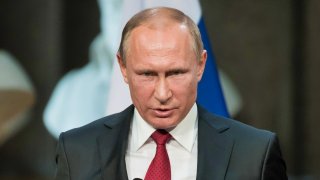Sam Greene

Justice for Navalny: Five Effective American Responses - Alexei Navalny’s death weighs heavily on the consciences of Western leaders, slow as they were to recognize the threat posed by Russia’s corruption and authoritarianism. That is as it should be. It will be in vain, however, if it is not made to weigh even more heavily on the fortunes of the men who murdered him.
President Joe Biden’s promise that Moscow would face “devastating consequences” if Navalny died in prison was, of course, made seven months before Russia’s full-scale invasion of Ukraine. Most of the kinds of sanctions and other responses that might have been on the table in early 2021 have, by early 2024, already been imposed, a fact that almost certainly factored into Vladimir Putin’s own calculations.
That does not mean, however, that Washington is without options. In fact, there are five key policies that, if implemented consistently and in concert with America’s allies, can have a genuine impact on the Kremlin, on the prospects for Putin and those who challenge him, and on the longer-term future of Russian politics.
5 Ways Joe Biden Can Respond
First, the US must make the fate of political prisoners central to its Russia policy. Navalny – while Putin’s most prominent political prisoner – was far from the only one. The Russian human rights organization Memorial, now forced to operate from exile, estimates that there are nearly 700 people on being held in Russian prisons for the crime of being brave enough to stand up against Putin, his war, and his campaigns of domestic repression. These include other prominent opposition politicians, such as Vladimir Kara-Murza and Ilya Yashin, journalists like Evan Gershkovich and Alsu Kurmasheva (both, not incidentally, American citizens), and many, many more people whose names are less familiar but whose peril is no less severe.
The US must do everything in its power to keep these people alive. It was a core tenet of Cold War diplomacy that constant reminders that the Washington had its eye on Moscow’s political prisoners made it at least a little bit harder for the Kremlin to murder them. While publicity did not keep Navalny alive, that is not an excuse for giving up on the rest. Equally importantly, making political prisoners a highly visible policy priority communicates to those brave enough to continue opposing Putin that America will have their backs. For an activist, that sense of support and solidarity can make the difference between giving up and staying in the fight.
Second, American policymakers must back support for political prisoners with real, material force. As a new study from the Center for European Policy Analysis (CEPA) makes clear, although Putin may eventually be replaced by someone who wants to rebuild bridges to the West, the structures and instincts of autocracy will remain. While support for Russian democracy cannot supersede support for Ukrainian sovereignty, it must be made clear both to Putin and to anyone who might succeed him that there can be no diminution of sanctions as long as political prisoners remain.
Third, the US and Europe must open avenues for asylum and shelter for Russian citizens fleeing repression and the war. Navalny’s sense of dignity and purpose led him to put himself in harm’s way, but that is a sacrifice we cannot and should not demand of all of Putin’s opponents. Failure to provide protected status to political refugees from Russia – akin to the support the US provides for Cubans, Venezuelans and others – is both morally and pragmatically unjustifiable. Forcing Russian dissidents to stay in Russia or to return home from an untenable exile hands Putin more victims and forces his opponents to choose between their safety and their conscience. Neither of those outcomes is in America’s interest.
Fourth, and relatedly, until such time as all political prisoners have been released and those responsible for Navalny’s death have been brought to justice, the US and Europe should formally sever ties with Russian law enforcement. The absence not only of due process but of basic regard for human life makes Russia an unreliable partner for cooperation on trafficking, organized crime, counter-terrorism and money laundering. It also means that no Western court or authority should ever sanction the extradition of a suspect for trial in Russia, or deport, even to a third country, any Russian citizen likely to face trial at home.
And fifth, the clearest way to honor Navalny’s legacy is to commit to Russia’s military defeat in Ukraine. Some Western voices may be tempted to believe that de-escalation in Ukraine might lead to de-escalation in Russia itself, creating more room for democrats. It is telling that no one in Russia’s democratic opposition believes this to be true. Navalny himself argued lucidly that democracy could never take hold in Russia as long as the country retained its imperial ambitions, and that those ambitions would persist for as long as the Kremlin, under any leadership, can convince the population that its adventure in Ukraine was anything other than an unmitigated disaster.
These five steps will not immediately lead to the fall of Putin’s regime or guarantee the safety of Russia’s other political prisoners. Having watched patiently as Putin built his autocracy, Western leaders should not be surprised or dismayed by the lack of instant solutions. They can, however, impose real costs on the Kremlin, by bolstering the opposition’s ability to withstand repression, undermining the effectiveness of Putin’s police state, recommitting to defeating Putin on his most important battlefield, and giving Russia’s future leaders clear incentives to make fundamental change.
No comments:
Post a Comment